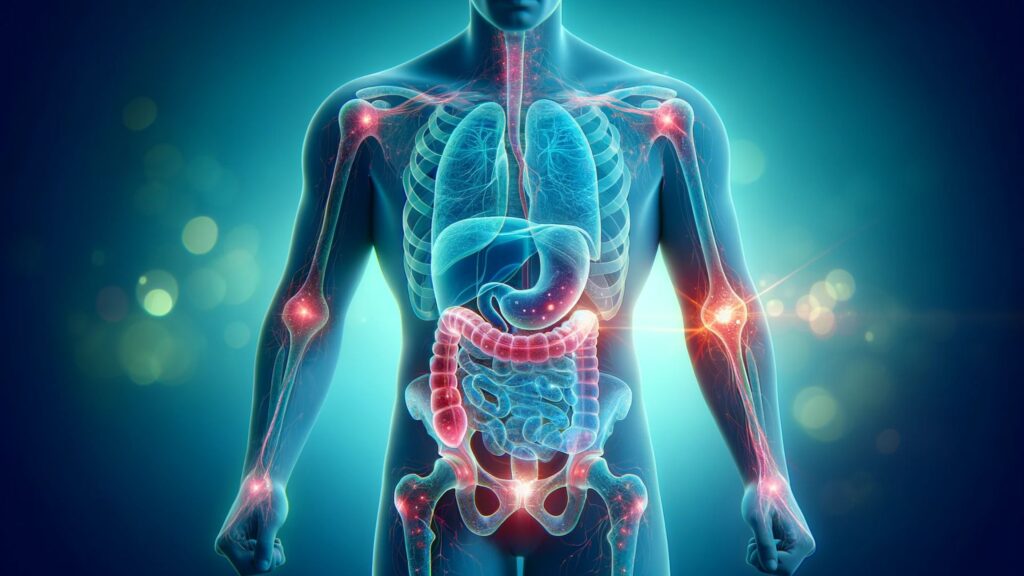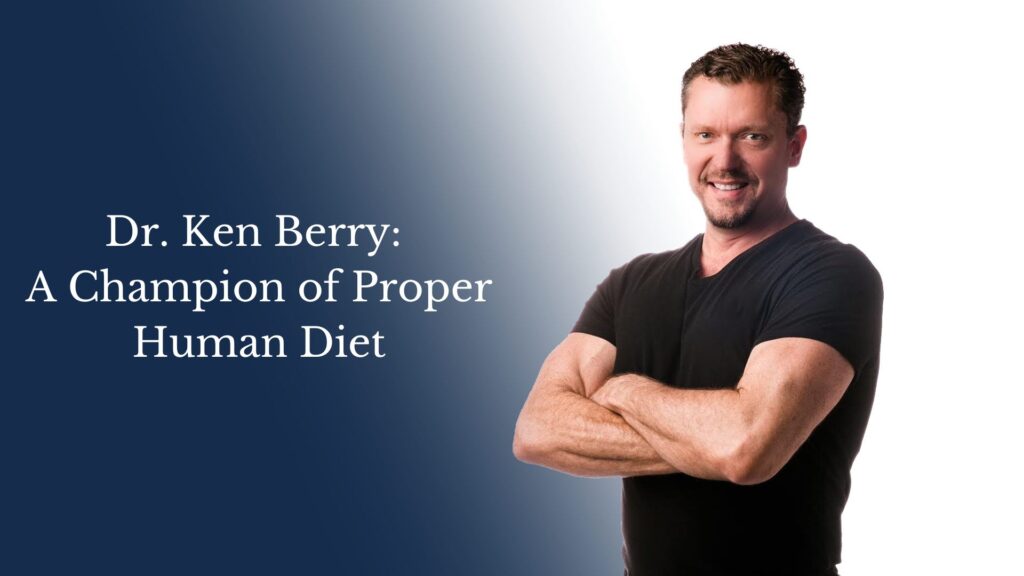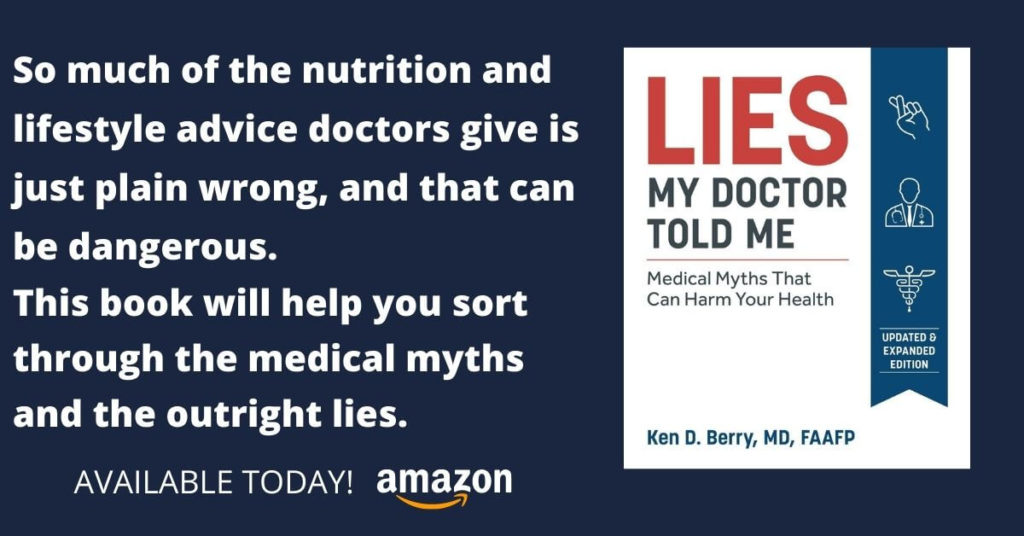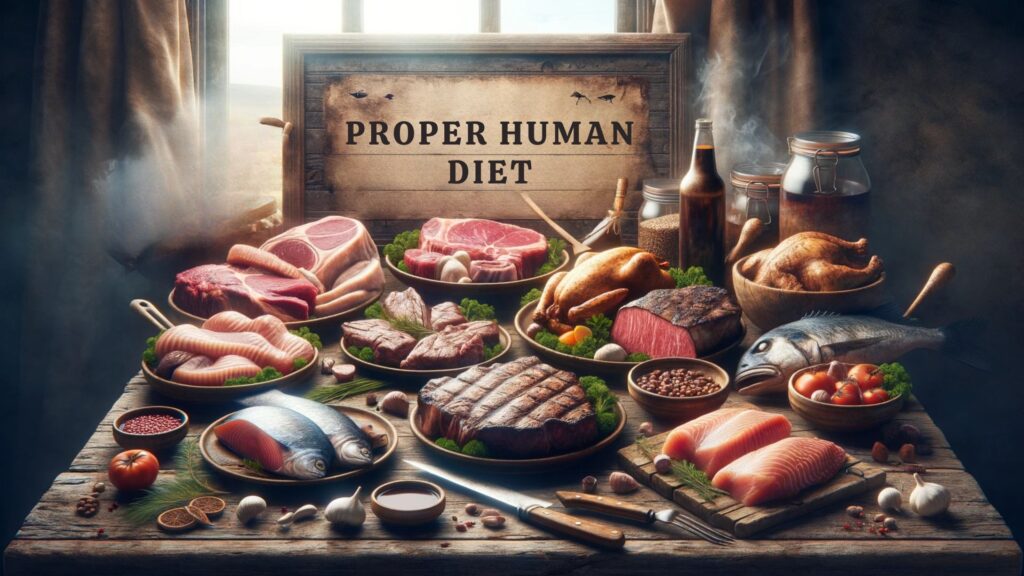Introduction: Unveiling the “Proper Human Diet” – A Paradigm Shift in Health and Nutrition
Welcome to a transformative journey into the realm of health and nutrition, where the wisdom of Dr. Ken Berry shines a new light on our understanding of dietary choices and their profound impact on our well-being. This exploration introduces you to the concept of the “Proper Human Diet,” a groundbreaking approach that goes beyond mere weight loss, aiming to revolutionize how we think about food in relation to chronic diseases and overall health.
Embracing a New Dietary Perspective
Dr. Ken Berry, a respected voice in the field of health and nutrition, presents the “Proper Human Diet” as more than just a diet plan; it’s a holistic approach to eating that aligns with our physiological needs. This diet is not a one-size-fits-all solution but a customizable framework designed to restore and maintain optimal health. It challenges conventional dietary wisdom, urging us to rethink our relationship with food.
Linking Diet with Chronic Diseases
The connection between what we eat and chronic diseases cannot be overstated. Dr. Berry emphasizes that many of the chronic and progressive diseases plaguing modern society – think of conditions like diabetes, heart disease, and obesity – are often rooted in our dietary choices.
He points out that our body’s default setting is one of good health, and it’s the disruption caused by certain foods that leads to these health issues. This revelation is both eye-opening and empowering, guiding us to make dietary choices that support, rather than hinder, our health.
The Weight Management Connection
Weight management is a crucial aspect of the “Proper Human Diet.” However, Dr. Berry’s approach transcends the conventional calorie-counting and restrictive dieting methods. Instead, it focuses on the quality of the foods we consume and their impact on our body’s metabolic processes.
By understanding how different foods trigger various hormonal and physiological responses, we can make informed choices that not only help in managing weight but also contribute to overall health and disease prevention.
If you’re keen to delve deeper into the “Proper Human Diet” and begin your journey toward a healthier lifestyle, I highly recommend reading our Beginner’s Guide to the Proper Human Diet. This guide is an excellent resource for those starting out, providing step-by-step advice and insights to help you seamlessly adopt this transformative approach to nutrition.
Setting the Stage for a Healthier Life
As we delve deeper into the insights provided by Dr. Berry, we embark on a journey that redefines the role of diet in our lives. It’s a journey that promises not just a healthier body but a transformed lifestyle where food becomes a source of nourishment and healing. The “Proper Human Diet” is not just about what we eat; it’s about rediscovering how to eat for life, longevity, and vitality.
In the following sections, we will explore the intricate details of this diet and uncover how it can be a powerful tool in combating chronic diseases, managing weight effectively, and ultimately leading a life brimming with health and vitality. Read on as we unravel the secrets of the “Proper Human Diet” and how it can be the key to unlocking your best health yet.
Chronic Diseases and the Role of Diet: A Deep Dive into Dr. Berry’s Insights

Unraveling the Complexity of Chronic Diseases
In the quest for a healthier life, understanding the intricate relationship between diet and chronic diseases is pivotal. Dr. Ken Berry brings to light a critical aspect of this relationship, focusing on three key factors: hypoglycemia, hyperinsulinemia, and chronic inflammation. These conditions, often overlooked, play a significant role in the development and progression of chronic diseases.
Hypoglycemia and Its Dietary Implications
Hypoglycemia, a condition characterized by abnormally low blood sugar levels, is more than just a temporary inconvenience. It is a signal indicating a deeper imbalance in the body’s ability to manage glucose. Dr. Berry points out that dietary choices leading to frequent hypoglycemic episodes can set the stage for more serious health problems. By choosing foods that stabilize blood sugar levels, we can avoid the pitfalls of this condition.
The Hyperinsulinemia Connection
Hyperinsulinemia, the condition of having excessively high levels of insulin in the blood, is another piece of the puzzle. It’s not just about the sugar we consume but also about how our body responds to it. Dr. Berry suggests that a diet high in processed carbohydrates and sugars can lead to hyperinsulinemia, which, in turn, is a precursor to a range of chronic diseases, including type 2 diabetes and heart disease. The “Proper Human Diet,” with its emphasis on low-carbohydrate, nutrient-dense foods, aims to regulate insulin levels and mitigate these risks.
Chronic Inflammation: The Silent Culprit
Chronic inflammation is often the silent undercurrent in many chronic diseases. It’s a state where the body’s immune response lingers, leading to tissue damage and various health issues. Dr. Berry advocates for a diet that quells this inflammation, highlighting the role of certain foods in exacerbating or alleviating this condition. The “Proper Human Diet” focuses on anti-inflammatory foods that support the body’s natural healing processes.

Restoring Good Health as the Default
At the heart of Dr. Berry’s philosophy is the belief that good health is our natural state – our “default condition.” He asserts that by adhering to the “Proper Human Diet,” we can reset our bodies back to this state. This diet isn’t just about avoiding illness; it’s about creating a foundation of good health where the body functions optimally, free from the burdens of chronic diseases.
Conclusion: The Power of Dietary Choices
In this enlightening discussion on chronic diseases and diet, we are reminded of the powerful role our dietary choices play in shaping our health. Dr. Berry’s insights into the “Proper Human Diet” offer a path not just to disease prevention but to a restoration of our inherent state of good health. As we navigate through the complexities of modern diets and health advice, remembering this fundamental connection between what we eat and how we feel is key to a life of vitality and wellness.
The “Proper Human Diet” and Type 2 Diabetes: A New Approach to Management and Cure

In the intricate dance of diet and disease management, Dr. Ken Berry’s perspective on type 2 diabetes stands as a beacon of innovative thinking. His analysis of a meat-centric diet within the framework of the “Proper Human Diet” opens up new avenues for managing and potentially curing this widespread condition.
Embracing a Meat-Centric Diet for Diabetes Management
Type 2 diabetes, long viewed as a chronic and often progressive disease, is traditionally approached with a focus on carbohydrate restriction and medication management. However, Dr. Berry shifts the paradigm, suggesting that a diet rich in meat and low in carbohydrates could be the key to not just managing but potentially reversing type 2 diabetes. This approach aligns with the body’s natural metabolic processes, supporting the restoration of insulin sensitivity and blood sugar regulation.
The Mechanisms at Play
In this meat-centric diet, the focus is on nutrient-dense, high-protein foods that provide essential nutrients without causing significant spikes in blood sugar levels. This dietary pattern helps in reducing the strain on the pancreas and the body’s insulin response, thereby addressing the root cause of type 2 diabetes. It’s a profound shift from the conventional low-fat, high-carb dietary recommendations that have dominated the diabetes management scene for decades.
Questioning Conventional Dietary Studies
Dr. Berry doesn’t shy away from critiquing the standard dietary studies and guidelines that have shaped public perception and medical advice on diabetes management. He argues that many of these studies fail to consider the full spectrum of human physiology and the impact of various diets on long-term health. By overlooking the potential benefits of a meat-centric diet, these studies may have limited the scope of effective diabetes management strategies.
A Call for Rethinking Diabetes Management
This critique extends to a broader call for rethinking how we manage type 2 diabetes. Dr. Berry urges us to look beyond the traditional carbohydrate-focused lens and consider a more holistic approach to diet. The “Proper Human Diet,” with its emphasis on meat and low-carb foods, presents a compelling alternative that aligns with our evolutionary dietary patterns and modern nutritional needs.
Conclusion: Paving the Way for Healthier Futures
The conversation around the “Proper Human Diet” and its impact on type 2 diabetes is more than just a dietary debate; it’s about reimagining the possibilities for health and wellness. Dr. Ken Berry’s insights challenge us to question the status quo and explore new dietary frontiers for the management and potential cure of type 2 diabetes. In this journey towards better health, the “Proper Human Diet” stands as a testament to the power of informed, innovative thinking in transforming our approach to chronic disease management.
Carbohydrate Tracking in the “Proper Human Diet”: A Key Strategy for Managing Type 2 Diabetes

In the realm of the “Proper Human Diet,” as envisioned by Dr. Ken Berry, lies a critical component for managing type 2 diabetes: effective carbohydrate tracking. This approach is not just about cutting carbs; it’s about understanding and managing their impact on the body, particularly for those with diabetes.
The Critical Role of Carbohydrate Management
At the heart of type 2 diabetes management is the regulation of blood sugar levels, and carbohydrates play a leading role in this process. Dr. Berry emphasizes that managing carbohydrate intake is crucial for individuals following the “Proper Human Diet.” It’s about making informed choices that align with the body’s needs, helping to stabilize blood sugar levels and improve insulin sensitivity. This approach goes beyond mere restriction, aiming for a balanced and sustainable way of eating that supports overall health.
Personalizing Your Diet with Carb Tracking
What sets Dr. Berry’s approach apart is the emphasis on personalization. Each individual’s body responds differently to carbohydrates, making personalized tracking essential. By monitoring and adjusting carbohydrate intake based on personal responses, individuals can find the optimal balance for their health. This tailored approach ensures that the diet is not only effective in managing diabetes but also sustainable and enjoyable in the long term.
Tools for Effective Carbohydrate Tracking
To aid in this personalized journey, Dr. Berry recommends the use of digital tools and apps like Carb Manager or Chronometer. These tools are designed to help individuals track their daily carbohydrate intake, making it easier to understand and adjust their diets. By providing insights into how different foods affect blood sugar levels, these apps empower individuals to make informed dietary choices that align with the “Proper Human Diet.”
Strategies for Implementing Carbohydrate Tracking
Implementing carbohydrate tracking requires more than just the right tools; it involves a mindset shift. Dr. Berry encourages individuals to view this tracking as a journey of discovery about their bodies and health. It’s about experimenting with different foods, observing the body’s responses, and adjusting accordingly. This process is not just about managing diabetes; it’s about taking control of one’s health and well-being.
Conclusion: Embracing a New Way of Eating
Carbohydrate tracking within the “Proper Human Diet” framework is a powerful strategy for individuals looking to manage type 2 diabetes effectively. By focusing on personalization and the use of digital tools, Dr. Berry’s approach offers a path to not just better diabetes management but a healthier, more informed way of living. It’s a journey that invites us to engage actively with our diet, transforming the way we eat and, ultimately, the way we live.
Medical Misconceptions and the “Proper Human Diet”: Bridging the Knowledge Gap

In the evolving landscape of health and wellness, Dr. Ken Berry’s “Proper Human Diet” emerges as a beacon of change, challenging long-held medical misconceptions. At its core, this approach addresses a significant gap in the medical community’s understanding of diet’s role in managing chronic diseases, advocating for a pivotal shift from medication-focused treatment to diet-based solutions.
Confronting the Knowledge Gap in Healthcare
One of the most striking aspects of Dr. Berry’s philosophy is the spotlight it throws on the lack of dietary knowledge within the medical community. For years, the focus has been heavily skewed toward pharmacological interventions, often overlooking the profound impact of dietary choices on health. Dr. Berry calls attention to this oversight, emphasizing the need for a more comprehensive understanding of nutrition and its role in disease prevention and management.
The “Proper Human Diet” as a Therapeutic Tool
The “Proper Human Diet” is not just a set of dietary guidelines; it’s a therapeutic tool, a means to address and potentially reverse chronic conditions. Dr. Berry urges medical professionals to consider diet as a primary intervention, a foundation upon which health can be restored. This perspective is not just revolutionary; it’s a return to the basics of human physiology, recognizing the power of food as medicine.
Shifting from Pills to Plates
The transition advocated by Dr. Berry is profound – moving from a pill-centric approach to one that places nutrition at the forefront. This shift is about empowering patients and doctors alike to explore dietary solutions as the first line of defense against chronic diseases. It’s about replacing the prescription pad with a grocery list and the pharmacy with the kitchen, transforming the way we think about treatment and health care.
Overcoming Resistance and Embracing Change
Embracing the “Proper Human Diet” within the medical community requires overcoming resistance to change. It involves re-educating healthcare providers about the critical role of nutrition and dismantling the myths that have long governed dietary advice. Dr. Berry’s approach calls for a new era of medical practice where diet is recognized as a key component of health and wellness, not just an afterthought.
Conclusion: A New Frontier in Health Care
The integration of the “Proper Human Diet” into medical practice represents a new frontier in health care, one where dietary choices are as critical as any medication. Dr. Berry’s insights pave the way for a future where managing chronic diseases is as much about what we eat as it is about what we’re prescribed. This shift in perspective has the potential to not only improve individual health outcomes but also revolutionize the approach to healthcare, making it more holistic, effective, and attuned to the natural needs of the human body.
The Benefits of a Low-Carb, High-Protein/Fat Approach in the “Proper Human Diet”

In the journey towards optimal health, the “Proper Human Diet,” as proposed by Dr. Ken Berry, introduces a compelling narrative: the benefits of a low-carb, high-protein, or high-fat diet. This dietary shift not only challenges conventional nutrition wisdom but also opens up new vistas for understanding the impact of our food choices on overall health.
Unveiling the Power of Low-Carb Diets
The cornerstone of the “Proper Human Diet” lies in its low-carbohydrate approach. This strategy is not a mere trend; it’s a science-backed pathway to better health. By reducing carbohydrate intake, these diets aim to stabilize blood sugar levels and reduce insulin spikes, thereby addressing the root causes of many metabolic disorders. This approach is especially beneficial for individuals battling insulin resistance, obesity, and type 2 diabetes.
The Role of High-Protein and High-Fat in Nutrition
In the place of carbohydrates, the “Proper Human Diet” emphasizes the importance of high-quality proteins and fats. Proteins are essential for muscle repair, hormone production, and overall bodily functions, while healthy fats are crucial for brain health, energy, and satiety. This combination not only nourishes the body but also keeps hunger at bay, making it easier to maintain a healthy weight.
Contrast with Traditional High-Carb Diets
Traditional high-carb diets, often rich in processed foods and sugars, stand in stark contrast to the “Proper Human Diet.” While these diets may offer short-term energy, they can lead to long-term health issues like chronic inflammation, hormonal imbalances, and increased risk of lifestyle diseases. Dr. Berry’s approach calls for a reevaluation of these dietary patterns, advocating for a diet that is more in tune with our body’s natural needs.
Health Impacts: Low-Carb vs. High-Carb
The health impacts of a low-carb, high-protein/fat diet versus a high-carb diet are significant. Low-carb diets have been linked to improved cardiovascular health, better blood sugar control, enhanced mental clarity, and sustained weight loss. In contrast, diets high in refined carbs and sugars are often associated with obesity, diabetes, and a host of other health issues.
Conclusion: Embracing a Healthier Lifestyle
Adopting a low-carb, high-protein, or high-fat diet as part of the “Proper Human Diet” is more than just a way of eating; it’s a lifestyle choice. This approach encourages us to reevaluate our relationship with food, understand our bodies better, and make choices that support our long-term health and well-being. Dr. Berry’s insights not only challenge conventional dietary norms but also offer a path to a healthier, more vibrant life.
Conclusion: Embracing the “Proper Human Diet” for a Healthier Future

As we reach the culmination of our exploration into Dr. Ken Berry’s “Proper Human Diet,” it’s time to reflect on the key insights and consider the profound impact this approach can have on our health and well-being. This journey into the realms of nutrition and health opens up new possibilities for managing chronic diseases, achieving weight loss, and enhancing overall quality of life.
A Recap of the “Proper Human Diet”
- Chronic Diseases and Diet: Dr. Berry’s insights reveal the critical role of diet in managing chronic conditions like hypoglycemia, hyperinsulinemia, and chronic inflammation.
- Type 2 Diabetes Management: The meat-centric approach of the “Proper Human Diet” offers a new perspective in potentially reversing type 2 diabetes.
- Carbohydrate Management: Effective carbohydrate tracking is highlighted as a key tool for those following the “Proper Human Diet,” especially for managing diabetes.
- Medical Misconceptions: This diet challenges the traditional medication-focused treatments, advocating for a diet-first approach in the medical community.
- Low-Carb, High-Protein/Fat Benefits: The diet emphasizes the importance of low-carb, high-protein, and high-fat foods, contrasting with traditional high-carb diets and their associated health risks.
The Potential Benefits Unveiled
Embracing the “Proper Human Diet” could lead to remarkable health benefits. From stabilizing blood sugar levels and reducing the risk of chronic diseases to achieving sustainable weight loss and improving overall vitality, the potential benefits are both broad and profound. This diet encourages a holistic approach to eating, focusing on foods that nourish and heal the body.
An Invitation to a Healthier Life
As we conclude, consider this an invitation to embark on a journey towards better health. The “Proper Human Diet” is more than a dietary regimen; it’s a pathway to rediscovering how to nourish your body in alignment with its natural needs. Whether you’re looking to manage a chronic condition, lose weight, or simply improve your overall health, this diet offers a blueprint for a healthier, more vibrant life.
Final Thoughts
The journey towards health is deeply personal, and the “Proper Human Diet” provides a versatile framework that can be adapted to meet individual needs and goals. By embracing this approach, you’re not just changing your diet; you’re taking a step towards a more empowered and informed way of living. It’s about making choices that respect and enhance your body’s innate capabilities. As Dr. Berry reminds us, the path to better health is within reach, and it starts with what we put on our plates.
To complement your understanding of the “Proper Human Diet” and to get started with practical, everyday meal planning, be sure to explore our 7-Day Meal Plan featuring Proper Human Diet Recipes. This resource is perfect for those looking to integrate the diet into their daily life with delicious, easy-to-prepare recipes tailored to support your health journey.
As an Amazon Associate, I earn from qualifying purchases. This does not impact my recommendations or alter the price you pay, but it does help support my site and my mission to provide quality content.
Explore Our Curated Collection of Books on the Proper Human Diet

For those interested in deepening their knowledge about the “Proper Human Diet” and its principles, I recommend visiting our Books section, where you can find a curated selection of books. These readings provide in-depth insights and comprehensive guidance on adopting and thriving on this diet, making them invaluable resources for anyone on this health journey.
Interpretation Disclaimer
This article is based on my interpretation of the concepts and ideas expressed by Dr. Ken Berry in the referenced YouTube interview (https://youtu.be/qIAEU1WXY_I?si=IrUdszMhH6Eac7BM). It is important to note that these interpretations are my own and may not fully or accurately represent the entirety of Dr. Berry’s views or medical advice on the “Proper Human Diet.” For complete and detailed understanding, please refer directly to Dr. Berry’s original content and guidance.
Medical Disclaimer
This article is for informational purposes only and is not intended as medical advice. Always consult a healthcare professional before making any changes to your diet or health regimen. The information and opinions presented are based on the “Proper Human Diet” as advocated by Dr. Ken Berry and do not necessarily reflect the views of medical professionals or health authorities.


